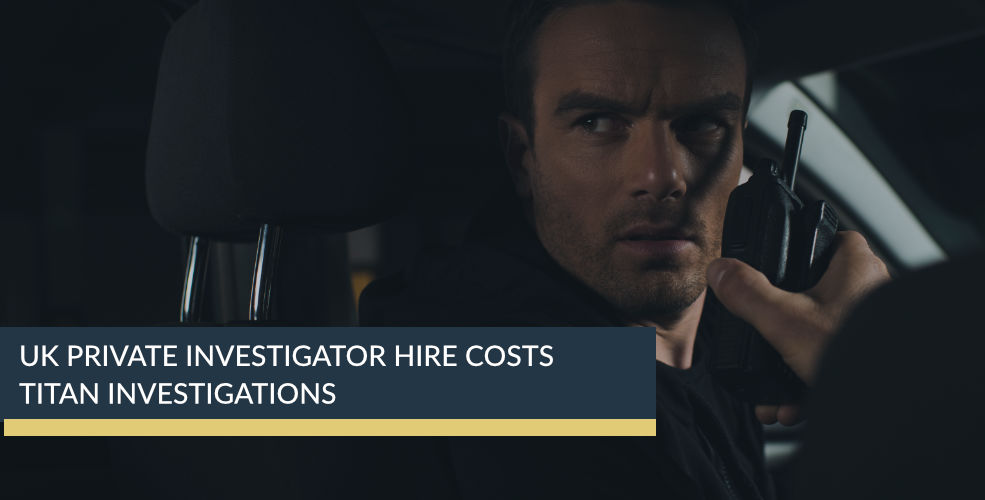Private investigators can be a big choice. Making the right choice for your investigation is essential. Here are a few things you should consider when choosing the best private investigators.
Make sure the private investigator you select is licensed and certified according to the local laws. The requirements for licensing vary depending on the location, and a legitimate investigator must comply to local laws.
Experience and Specialization
Take into consideration the experience and knowledge of the investigator's experience and expertise. Certain investigators are specialized in specific areas, such as background checks, surveillance, or corporate investigations. Pick an investigator with experience in your area of expertise.
Reputation Reviews
Look for reviews and testimonials from previous clients. An experienced investigator must have positive reviews and an established reputation. You can also search online review websites or ask to see references.
Confidentiality & Disretion
In an investigation, confidentiality is key. Verify that the investigative company understands the value of discretion, and that they are able to protect the confidentiality of clients.
Insurance
Find out if the investigator has insurance. This will protect both parties in case of any complications that could arise during the investigation. Professional detectives should be able to provide proof of their insurance.
Cost and Billing structure
Know the fees and the billing system before you engage an investigator. Certain investigators charge per hour, while other charge flat fees. You must be certain about the costs.
Communication Skills
Communication is the key. Select an investigator that listens to you, explains their services in a clear manner, and is in constant and transparent communication with you throughout the course of the investigation.
Technology and Tools
Ask about the latest technology and tools that the investigator employs. To increase the effectiveness and efficiency of an investigation, contemporary investigators need to be well-versed in the most recent tools and techniques.
Ethics and professionalism
Choose an investigator who has professionalism and who adheres strictly to the ethics code. In the course of investigations, ethics is essential. A reputable investigator puts ethical principles first.
Networking and Resources
Take into consideration the network and resources of the researcher. Investigators with experience often have a vast network of resources and contacts that could prove useful when seeking information. This can be crucial particularly for cases that are complex.
Clear Contract and Terms
Check that the contract outlines all of the conditions and terms before engaging an investigator. Read the contract carefully and ask any questions before beginning.
Available and Timelines
Discuss the availability of your investigator, as well as any timeframes you anticipate for the investigation. Professional investigators should be able provide realistic estimates on how long an investigation will be.
Jurisdiction and location
It is essential to take into consideration the place of the investigator's residence and the area in which they have been licensed. It is beneficial to employ an investigator that is knowledgeable of local laws and procedures.
Compatibility
Select an investigator who you are comfortable with and who has the same values as you do. Do not be afraid to follow your instincts.
Do thorough research and get recommendations before making any decision. The results of your investigation could be greatly affected by the selection of a private investigator. Have a look at the most popular Private investigators for more examples including private investigator do, undercover private investigator, private investigator courses, free private investigators, private detective phoenix, private investigation agency near me, hire an investigator, private investigator tips, find a private investigator, private surveillance investigator and more.

What Do I Need Know About Insurance Investigations
Insurance investigations are conducted to verify the legitimacy of claims, in order to avoid fraud, and ensure that policies aren't being misused. The investigations, which could cover health, property and auto insurances as well, are designed to protect both the insurer and policyholders. You should be aware of the different types of insurance investigations.
Claim Investigations An investigation into an insurance claim is done to determine the legitimacy and extent of coverage under the policy.
Surveillance Investigations Conducting surveillance to confirm the authenticity of information provided in a claim and to identify potential fraud.
Background Investigations Examining the background of claimants to uncover any pattern or anomalies that could indicate fraud.
Interviewing Witnesses and other parties to confirm details or gain more information.
Insurance Fraud
Insurance fraud has become a significant issue and investigators usually focus their efforts on detecting or preventing fraudulent behavior. Insurance fraud includes false claims, staged injuries, and intentional damage.
Surveillance Techniques
Investigators employ a variety of surveillance methods to track claimants, which includes photographic and video evidence.
Certified Investigators
Insurance investigations are often performed by private investigators with licenses or investigators employed by the insurance company. They have the experience and skills necessary to handle these kinds of instances.
Legal Compliance
The investigation of claims for insurance is to be conducted in accordance with the law and regulations regarding privacy. Investigators need to ensure that the methods they employ are legal and that the rights of those who are being investigated are respected.
Interviewing Skills
Interviews are often carried out by investigators who interview witnesses and claimants. Interviewing skills are vital to extracting accurate and detailed details.
Technology
Technology is an essential component of insurance investigation. Investigators can make use of databases and analysis of social media to gather data and verify facts.
Collaboration with Law Enforcement
If fraud is deemed to be suspect by the investigators, they can cooperate with police agencies to establish a solid case and pursue legal action.
Documentation & Reporting
The documentation and gathering of evidence of the investigative process is crucial. Investigators write detailed reports that can be utilized by lawyers and insurance companies to make educated claims decisions.
Expert Opinions
To assess the validity and offer expert opinions Investigators are able to ask experts from various fields, like accident reconstruction specialists or medical professionals.
Claim Resolution
Based on the information of the investigation, the insurance company can make a well-informed decision regarding the resolution of a claim that includes approving it, denying it due to fraud or negotiating the settlement.
Ethics and Professionalism
Ethics is a major factor in insurance investigation. Investigators are expected to conduct their investigations with professionalism and integrity.
Investigations into insurance fraud are crucial to ensure the integrity of insurance and fair treatment of policy holders. These investigations are essential in preventing fraudulent activity as well as safeguarding legitimate claimants and also contributing to the security of the marketplace. Take a look at the most popular local Private investigators for blog recommendations including investigator online, private investigation companies, private investigation agency, investigators license, investigation services near me, private investigation companies, private pi, private investigator boise idaho, investigator private, hire an investigator and more.
